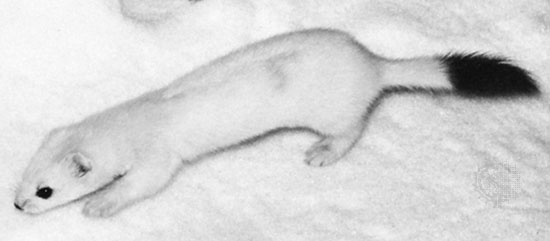ermine
mammal
 any of several northern weasel (q.v.) species of the genus Mustela, family Mustelidae, called ermine especially during the winter-white colour phase; this white coat is the ermine of the fur trade.
any of several northern weasel (q.v.) species of the genus Mustela, family Mustelidae, called ermine especially during the winter-white colour phase; this white coat is the ermine of the fur trade.The species that furnished the ermine for royal robes in Europe was the stoat (M. erminea), also called short-tailed weasel, or Bonaparte weasel. The ermine, or stoat, is found in northern North America, in Eurasia, and in North Africa. Ermines are most abundant in thickets, woodland, and semitimbered areas. These slender, agile, voracious mammals measure 13 to 29 cm (5 to 12 inches) in head and body length; have a tail length of 5 to 12 cm; and weigh less than 0.3 kg (0.66 pound). Females are smaller than males, and northern races smaller than southern.
In summer the ermine is brown, with whitish throat, chest, and belly. In colder climates the winter coat is white, except for the black tail tip. In moderately cold climates the fur becomes only partly white.
Ermines feed on small mammals, birds, eggs, frogs, and occasional invertebrates. Small prey is seized at the base of the skull, larger prey by the throat. The litter contains 3 to 13 young, born after a gestation prolonged as much as 10 months because of delayed implantation in the wall of the uterus.
The winter-taken pelts, prized for fineness and pure colour, are among the most valuable of commercial furs (fur) and are obtained mainly in northern Eurasia. During the reign of Edward III (1327–77) of England, the wearing of ermine was restricted to members of the royal family. Thereafter, state robes were constructed in such a way that in many cases the rank and position of the wearer could be determined by the presence or absence and the disposition of the black spots.
- Robert Bostwick Carney
- Robert Boyd, 1st Lord Boyd
- Robert Boyd Boyd, 1st Lord
- Robert Boyle
- Robert Bresson
- Robert Bridges
- Robert Brown
- Robert Browne
- Robert Browning
- Robert Bruce Foote
- Robert Burns
- Robert Burns Woodward
- Robert Burton
- Robert Bárány
- Robert Cambert
- Robert Campin
- Robert Capa
- Robert Carr, earl of Somerset
- Robert Carr Somerset, earl of
- Robert Carver
- Robert Casadesus
- Robert Catesby
- Robert Cecil, 1st earl of Salisbury
- Robert Cecil Salisbury, 1st earl of
- Robert C Grier